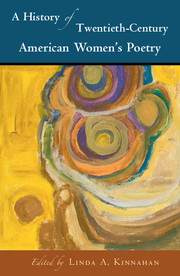Book contents
- Frontmatter
- Contents
- List of figures
- List of contributors
- Preface
- Acknowledgments
- PART I MAPPINGS AND CHRONOLOGIES
- 1 Critical Mapping I: The Category of the “Woman Poet” – An Introduction, by Way of Mapping
- 2 Critical Mapping II: Reading American Poetry by Women
- 3 Chronology I: American Women Poets, 1900–1950
- 4 Chronology II: American Women Poets, 1950–2000
- PART II ETHNICITY, RACE, AND IDENTITY
- PART III MATERIAL FORMATIONS
- PART IV LINEAGES, TIES, AND CONNECTIONS
- PART V FORM, LANGUAGE, AND TEXT
- PART VI CODA
- Bibliography
- Index
4 - Chronology II: American Women Poets, 1950–2000
from PART I - MAPPINGS AND CHRONOLOGIES
Published online by Cambridge University Press: 05 June 2016
- Frontmatter
- Contents
- List of figures
- List of contributors
- Preface
- Acknowledgments
- PART I MAPPINGS AND CHRONOLOGIES
- 1 Critical Mapping I: The Category of the “Woman Poet” – An Introduction, by Way of Mapping
- 2 Critical Mapping II: Reading American Poetry by Women
- 3 Chronology I: American Women Poets, 1900–1950
- 4 Chronology II: American Women Poets, 1950–2000
- PART II ETHNICITY, RACE, AND IDENTITY
- PART III MATERIAL FORMATIONS
- PART IV LINEAGES, TIES, AND CONNECTIONS
- PART V FORM, LANGUAGE, AND TEXT
- PART VI CODA
- Bibliography
- Index
Summary
The second half of the century brought with it an unprecedented number of women poets. While these numbers were augmented by an increased national population and rising educational levels, they were also propelled by social movements that insisted on increased opportunities and equality for minoritized and oppressed populations. By the mid-1950s the African American Civil Rights movement was underway, and by the 1960s it had segmented into Black Power and Black Arts movements. Building on centuries of concerted knowledge of racial injustice as well as of an evolving tradition of African American music, culminating in blues and jazz, the African American response contrasted markedly with the emerging women's movement. In 1963 Betty Friedan published The Feminine Mystique, with the catchphrase “the problem that has no name,” appealing primarily to a white middle-class female populace. Never mind that the problem without a name had been pointed to as early as Mary Wollstonecraft's A Vindication of the Rights of Women (1792) as well as by women activists and writers in the first half of the century. However, the silencing of this knowledge ultimately led to a far more widespread women's movement than ever before, through feminist consciousness-raising groups and the conviction that “the personal is political.”
For multiple groups, questions of equality, rights, and freedom toppled over into questions of identity, with diverse identity movements forming in the 1960s and 1970s, some separatist and others seeking intersectional affiliations. By the 1970s, there were multiple race, ethnicity, gender, and sexuality movements, all based on identity groups, including Asian American, Native American, Chicano, and gay and lesbian fronts. Out of each of these movements, identity issues created new energies for poetry and the questioning and refusal of identity brought about other poetries.
This radicalizing of the populace through identity politics received both impetus and pushback from large national events. World War II had ushered in a strong desire for a return to normalcy, which meant fathers in the workforce and mothers at home, despite the fact that during the war great numbers of women and minorities had entered the workforce. The largely accepted Korean War of the 1950s gave way to the much protested Vietnam War, followed by multiple conflicts and smaller wars that rocked the populace differently, such as in El Salvador, the first Iraq War, and Bosnia.
- Type
- Chapter
- Information
- A History of Twentieth-Century American Women's Poetry , pp. 56 - 72Publisher: Cambridge University PressPrint publication year: 2016



